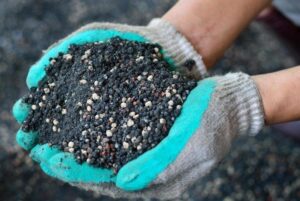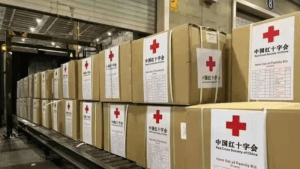
French authorities have the necessary resources to accommodate up to 100,000 refugees from Ukraine on their territory, French Interior Minister Gerald Darmanin said on Monday.
“Today, we can host up to 100,000 refugees. This has become possible thanks to the considerable efforts of the state and local authorities,” Le Figaro quoted him as saying.
“We continue to work on scenarios under which we can accept even more people,” the minister said.
The newspaper notes that about 13,500 Ukrainian refugees are currently registered in France.

The bravery of the Ukrainian leadership and people is immense, British Foreign Secretary Liz Truss tweeted after a conversation with her Ukrainian counterpart Dmytro Kuleba.
“The UK is doing all we can to support including defensive weapons and humanitarian aid,” Truss said.

The needs of Ukrainian farmers are met by 84% for the sowing season of 2022, by 55% in crop protection agents, by 78% in seed material, the most critical shortage of fuel for agricultural equipment, but the situation is already being resolved at the level of top officials.
This comment was given by Minister of Agrarian Policy and Food Roman Leschenko to Interfax-Ukraine on Monday.
“The total need for fertilizers for sowing is covered by 84%, in crop protection agents – by 55%. This indicator is unsatisfactory, but not critical, because the lack can be compensated for by imports from the EU countries, which are ready to provide us with all the necessary support. Especially that the agronomic deadlines for the introduction of crop protection agents fall mainly in May. The most critical problem is with fuel, it is solved at the level of top officials of the state,” the minister said.
He recalled that the agrarians begin preparations for the sowing season in the autumn of the previous year, so before the war they were able to prepare the necessary resources for the sowing season in approximately the same volumes.
Leschenko said that the need for seed material in Ukraine is provided by 78%. The vast majority of the material is already in the warehouses of agricultural producers.
“As for food security, it is too early to give any assessments – everything will depend on the military situation in the state. Ukrainian farmers are very courageous and ready to work in difficult conditions to ensure food security. There are no optimal calendar dates for sowing, they depend on weather conditions. We have a cold spring, so the start of the sowing campaign has been somewhat postponed. The main period this year will be in April-May,” the minister said.
According to him, the Ministry of Agrarian Policy is in constant contact with large distributors and producers of seeds and crop protection agents, which are doing everything possible to provide food and prevent a food crisis.

Some 1.758 million people from Ukraine crossed the border of Poland after the start of Russian aggression, the Chancellery of the Prime Minister of Poland said.
“Some 1.758 million people fleeing Ukraine have crossed the Polish border since the beginning of Russia’s aggression against this country. Some 82,100 people were cleared by Polish Border Guard officers yesterday,” the Chancellery of the Prime Minister of Poland said on Twitter.

On March 14, the third batch of humanitarian aid to Ukraine from the Chinese Red Cross Society will be shipped from Poland, and on March 15 it will be delivered to Lviv, the Chinese Embassy in Ukraine told Interfax-Ukraine.
Earlier, the first and second batches of humanitarian aid from China were transferred to Ukraine in transit through Romania and Hungary, respectively.
In addition, given the lack of food for residents of some regions of Ukraine, recently Chinese enterprises that have been operating in Ukraine for many years began to use their canteens and equipment for making bread and processing buckwheat. Food products are sold at cost to local residents who come and go shopping in droves, the embassy said.

As of 9:00 am on March 14, some 1,003 settlements remain without power in Ukraine, the State Emergency Service of Ukraine reports.
“Currently, 1,003 settlements have been de-energized, of which 20 are partially without power. The State Emergency Service has involved 12 generators to provide emergency power supply to social facilities, of which five are to provide electricity to hospitals,” the telegram channel says.